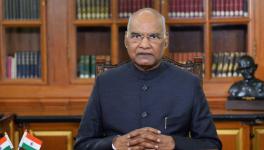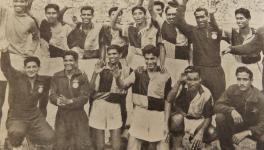Support for Half-truths in Gaurav Gill’s Arjuna Award Application Shows Motorsport Body’s Desperation

Gaurav Gill receives the Arjuna Award from the President of India Ram Nath Kovind at the Rashtrapati Bhavan on August 29 (Pic: President of India FB page).
Indian rally ace Gaurav Gill finds himself in the middle of two raging storms. The first is the issue of misrepresentation of facts in Gill’s Arjuna Award application form, a story that was broken by Vivek Mukherji for Newsclick. Given the details unearthed by the journalist — presented by Gill and rubber stamped by the FMSCI — a probe by both the governing body for motorsport in the country, as well as the sports ministry seems well warranted.
In fact, senior members of the FMSCI (Federation of Motor Sports Clubs of India) have called for an inquiry into the matter even as the federation, officially, has gone into denial mode, vouching for the authenticity of the claims made by Gill in the application.
You can read Gill entire Arjuna application form below:
As is evident, Gill has made a claim in the form that he won 11 stages in the WRC 2 (second tier) class of the World Rally Championship (WRC) in 2018. Something the Federation Internationale de l'Automobile (FIA) has deemed incorrect.
Meanwhile, the motorsport fraternity in India, along with the FMSCI, have gone into hyperdrive justifying the claim by pointing out that Gill was “fastest” on 11 stages (in the WRC 2 category RC2 class for R5 cars) of Kennards Hire Rally Australia, the final event of the 2018 WRC calendar. Gill retired from the rally in the second leg due to mechanical problems, but rejoined on Sunday under super rally rules.
The FMSCI, instead of clarifying the misleading claim made in Gill’s Arjuna application through a press release or a press conference, as established protocols dictate, has resorted to malarkey to cover its serious act of omission and commission by putting out a series of muddled tweets.
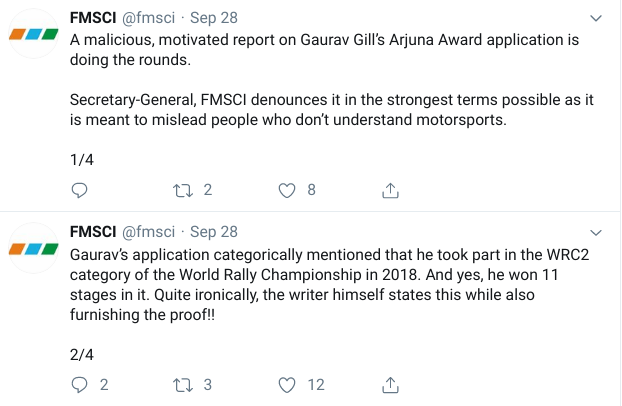
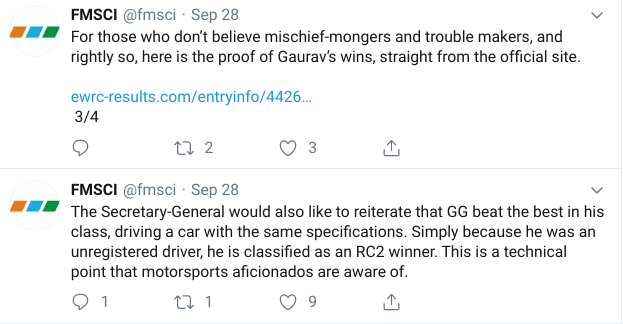
Through its tweets, the FMSCI made an extremely feeble and poor attempt to give a disingenuous spin to two critical facts mentioned in the Newsclick story.
1. That Gill took part in the 2018 WRC in the WRC 2 category.
2. He clocked the “fastest” times in the RC2 class among WRC2 cars.
What the FMSCI tweets doesn’t tell is that Gill took part in the 2018 races as a non-registered driver. It has been emphatically clarified by the FIA WRC Category Manager Andrew Wheatley that the “fastest” times set by Gill in 11 stages count for nothing because he was not even eligible to lay any claim on win or points in WRC 2 or any other sub category, and even if it did, at best it would have been “class stage win”. This is not what the FMSCI has disingenuously projected in the application.
This cannot be dismissed as a mere technicality as the secretary-general of the federation, Rajan Sayal, the signatory of the application, has tried in vain. It’s worth noting that the grossly misleading claim has been emphasised at three places in the 13-page application. This indicates that the FMSCI played fast and loose with facts. In trying to defend the indefensible, the FMSCI has attempted to give credence to something the FIA doesn’t consider even as an eligible claim.
That apart, since the motorsport fraternity in the country, using their routine garb that anyone outside the community doesn’t understand the nuances of the sport and hence are incorrect, are claiming Gill’s fastest times on the 11 stages are indicative of his quality against the best in the world, a realistic assessment of the performance is required. That would need a perspective. And we would have to take into account the field against which he achieved the fastest times.
Also Read | Exclusive: Did Gaurav Gill Misrepresent His Achievements to the Arjuna Award Selection Committee?
There is no question that Gill is India’s best. But whether he is right up there among the world’s elite is up for debate. One can say he is on his way, at best. Last year in Australia, Gill’s stage “fastest” times came in the final rally of the season where only two drivers in the top 20 of the year’s WRC 2 standings took part. Jan Kopecky of the Czech Republic, who won the 2018 WRC 2 world title, gave it a miss, and so did Sweden’s Pontus Tidemand and Kalle Rovenpara of Finland, the second and third finishers in the championship. There was nothing at stake in the rally for any of the top drivers as the title and standings were already decided by then.
Gill topped the time sheets among nine RC2 competitors out of which only five, including him, managed to complete the rally. In fact, Gill finished fifth and last in the rally among RC2 cars, despite the fastest times on 11 stages, because of the additional time penalty that he was given for stages that he was not able to complete due to mechanical failure. It clearly highlights the folly of celebrating it. For the record, he was 15th and last overall in the rally (across all categories).
Gill’s “fastest” stage times is akin to an athlete claiming he was on the podium after just winning one of the heats at the world championships. Now, the big question is: has the Arjuna Award and its benchmarks become so shallow or low that a heats winner at the world championships (in Gill’s case “stage win”) is eligible to be honoured?
Also, there is the minor fact that Gill is not the first Indian to represent the country in the World Rally Championship. In 2008, seven-time national champion Naren Kumar planted the Indian flag on the world stage (in the Production World Rally Championship - P-WRC) racing for Team Sidvin India that was run by multiple time world champion Tommi Mäkinen of Finland. In fact, Gill also made his P-WRC debut later that year for Sidwin, replacing Naren.
Gill’s best and clear cut performances so far have been his three Asia Pacific Rally Championship (APRC) victories (2013, 2016 and 2017). His earlier applications for the Arjuna, based on the APRC wins and other achievements, didn’t earn him a nomination from the respective committees. Now, in rallying terms, his performances in the APRC is no mean feat. However, it is evident that those were not considered high enough for the Arjuna Award in the past. This year, though, things seem to have changed with the mention of “World Championship” and “stage wins” in his application form.
Also Read | Aishwarya Pissay's World Title and the Reality of Motorsport's Gender Bias
However, those “stage wins” (if one can describe them that despite it being technically wrong), or, as the FIA has clarified, stage fastest times in RC2 cars, came in a very diminished field at a rally where nothing was at stake. A virtual dead rubber.
The rest is up for interpretation with the motorsport fraternity trying to throw technicalities while defending their champion, and the federation, using tweets, and refraining from a public press meet or press release, to “rubbish” reports of wrongdoing. In between all this, one of the country’s coveted sporting honours has lost its sanctity, while the whole episode seems to indicate that the Arjuna Award selection panel may not have exercised due diligence in this particular case.
Newsclick’s journalist, who published the piece questioning Gill’s application, has come under heavy fire from the motorsport community. This seems primarily motivated by the timing of the story. While on the editing table, undergoing fact-checks and seeking responses from the decision-making bodies, a tragic incident occurred at the Indian National Rally Championship (INRC) Rally of Jodhpur in Barmer district in which three people, locals on a motorcycle, entered the rally course and were killed on September 21.
The accident and subsequent FIR names Gill and his co-driver Musa Sherif for culpable homicide not amounting to murder is unfortunate since neither the driver nor the co-driver can be held responsible for it. The incident happened after the three villagers went inside a live rally stage, right onto the path of Gill who was on full throttle heading towards the flying finish.
Legal experts have been quoted in reports that the incident comes under ‘volenti non fit injuria’ (Latin: To a willing person, injury is not done), which states that when a person voluntarily consents to a risk, knowing the consequences associated with the risk, he/she cannot hold the other party responsible for injury. It is usually applied for injuries/fatalities at sporting events. No doubt, a thorough investigation is needed. However, prima facie, the driver is hardly the one to blame for such an incident.
It needs to be determined whether the organisers made enough arrangements to mark the rally stages and to properly inform locals about when these areas were off limits. This safety element is critical to both those inhabiting the areas along a rally’s course as well as to the drivers themselves.
One case, however, has nothing to do with the other and the motorsport fraternity is doing itself a disservice by conflating the two unrelated incidents. Putting pressure on the FMSCI to come out with a detailed, public explanation of both cases would appear to be in the best interests of the sport and those involved in it. Instead, all we are seeing is a series of personal attacks against a journalist trying to do his job and casual dismissal from the FMSCI.
Get the latest reports & analysis with people's perspective on Protests, movements & deep analytical videos, discussions of the current affairs in your Telegram app. Subscribe to NewsClick's Telegram channel & get Real-Time updates on stories, as they get published on our website.









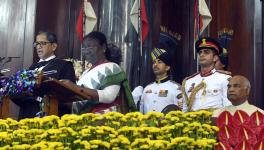
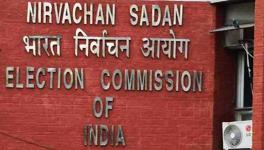
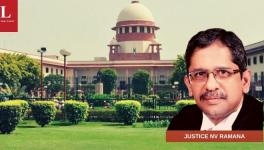

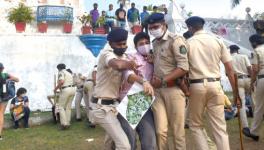

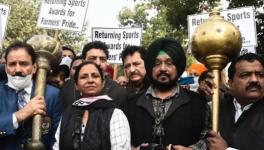
![President signs Ordinance to constitute a Commission for Air Quality Management in NCR and adjoining areas [Read Ordinance]](/sites/default/files/styles/hp_264x150/public/2020-10/air%20pollution11.jpg.jpeg?itok=R9lgZDsY)
